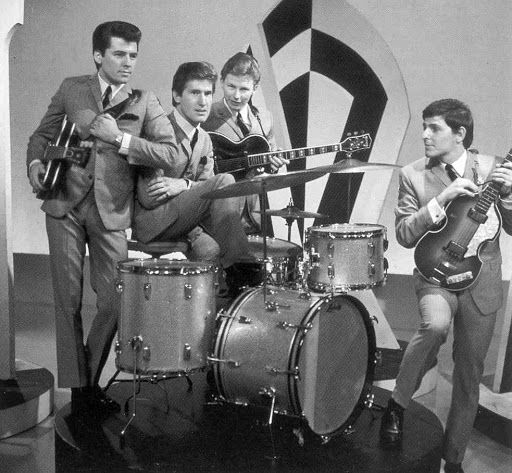If we talk about the cult rock bands of the early 1960s, then this list can start with the British band The Searchers. To understand how big this group is, just listen to the songs: Sweets for My Sweet, Sugar and Spice, Needles and Pins and Don't Throw Your Love Away.
The Searchers have often been compared to the legendary Beatles. The musicians were not offended by comparisons, but they still focused on their originality.

The history of the creation and composition of the group The Searchers
The origins of the team are John McNally and Mike Pender. The team was formed in 1959 in Liverpool. The name The Searchers was taken from the 1956 Western The Searchers, starring John Wayne.
The band grew out of an early skiffle band formed by McNally with his friends Brian Dolan and Tony West. The last two musicians lost interest in the group. Then Mike Pender joined John.
Soon another member joined the guys. We are talking about Tony Jackson, who perfectly mastered the bass guitar. Initially, the musicians performed under the creative pseudonym Tony and the Searchers, with Joe Kelly on percussion instruments.
Kelly briefly stayed in the young team. The musician gave way to Norman McGarry. So, the composition with McNally, Pender, Jackson and McGarry is called "golden" by music critics.
McGarry left the band in 1960. The place of the musician was taken by Chris Crummi. In the same year, Big Ron left the group. He was replaced by Billy Beck, who changed his name to Johnny Sandon.
The first performances of the new band took place at the Iron Door Club in Liverpool. The musicians called themselves Johnny Sandon and the Searchers.
In 1961, Sandon announced his retirement to fans. He found being in The Remo Four more lucrative. And I was not mistaken in my guesses.
The creative path of The Searchers
The team was transformed into a quartet. Each member of the group sang vocals. The name was shortened to The Searchers. The musicians continued to play at the Iron Door Club and other Liverpool clubs. They recalled that during the evening they could hold several concerts in different institutions.
Soon the musicians signed a lucrative contract with the Star-Club in Hamburg. The contract indicated that the band members were obliged to perform at the institution, playing a three-hour concert. The contract lasted a little over three months.
When the contract ended, the musicians returned to the Iron Door Club site. The group recorded sessions, which soon fell into the hands of the organizers of the recording studio Pye Records.
Then Tony Hutch was engaged in producing the team. The deal was later extended with Kapp Records of the US to sell their records in America. Tony played some parts on the piano. He was noted in some tracks. Under the pseudonym Fred Nightingale, Tony Hutch wrote the second single from Sugar and Spice.
After the release of the XNUMX% hit Needles and Pins, Tony Jackson left the band. The musician chose a solo career. His place was taken by Frank Allen of Cliff Bennett and the Rebel Rousers.

In the mid-1960s, another member left the band. It's about Chris Curtis. Soon he was replaced by John Blunt. The musician's style of playing was significantly influenced by Keith Moon. In 1970 John was replaced by Bill Adams.
Early 1970s and the Sechers group
In the early 1970s, the group began to have competitors. The musicians could not keep the same bar. In addition, there were no more obvious hits.
The Searchers continued to record tracks for Liberty Records and RCA Records. This period is marked by collaborations with Chicken in a Basket and a US spin-off hit in 1971 with Desdemona.
The team toured extensively. Soon the efforts of the musicians were rewarded. In 1979, Sire Records signed the band to a multi-album deal.
The discography of the British band has been replenished with two collections. We are talking about the records of The Searchers and Play for Today (outside of England, the last record was called Love's Melodies).
Both albums were highly acclaimed by music critics. Despite these works, they did not enter any charts. But compilations revived The Searchers.
Sechers signing with PRT Records
Soon there was information that the musicians had recorded a third studio album. The collection was to be called Sire. However, due to the reorganization of the label, the contract was terminated.
In the early 1980s, the band signed with PRT Records. The musicians started recording the album. But only one single was released, I Don't Want To Be The One (with the participation of the Hollywood team). The rest of the compositions were included in the 2004 collection.
After the release, Mike Pender left the group with a scandal. The musician created the Mike Pender's Searchers project. Mike was replaced by young vocalist Spencer James.
In 1988, the band signed with Coconut Records. Soon the band's discography was replenished with a new album, Hungry Hearts. The album includes remastered versions of Needles and Pins and Sweets For My Sweets, as well as a live version of Somebody Told Me You Were Crying. The collection was warmly received by fans and music critics.

The Searchers today
The band toured extensively in the 2000s with Eddie Roth replacing Adamson. The Searchers has become one of the most sought after bands of our time. The musicians skillfully mixed electric effects with acoustic sound.
In 2018, the team members announced that it was time for them to retire. They played a farewell tour that lasted until 2019. The musicians did not rule out the possibility of a reunion tour.



